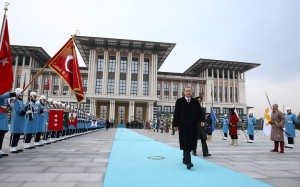
Turkish President Recep Tayyip Erdogan at the Presidential Palace (Photo: Official Website of the Turkish President)
Already, a few state leaders have announced that they will attend, including “Turkey’s little brother” Azerbaijan, some African and Muslim states, and notably, Prince Charles.
It is worthwhile to remind these guests, and the entire English-speaking world, of another Turkish scheme involving trickery of dates that happened eight years ago.
The Holy Cross Church and Monastery complex on Akhtamar Island in Lake Van in eastern Turkey had been in ruins since 1915 and, in fact, was being willfully destroyed in the 1950’s by the Turkish Army. Only interference by famous Kurdish author Yashar Kemal (whose hidden Armenian roots were recently revealed) prevented the complete destruction of the last remaining church. In the 2000’s, the Turkish government decided to restore the church as a museum. The restoration was completed in early 2007, and the government announced the date of the opening of the museum to be April 24, 2007.
The Istanbul Armenian Patriarch of the time, Archbishop Mesrob Mutafyan, forcefully protested that by choosing this date the government was attempting to create political gains using Armenians’ pain, and that he would refuse to attend the opening ceremony if this insensitive decision was not revised. The government appeared to appease the patriarch but, continuing to employ tactics of “Oriental slyness,” announced that the date would now be April 11, 2007. The government was fully aware that April 11 was equally significant and unacceptable to the Armenians, as in the old calendar, which was in effect in 1915, April 11 was the same date as April 24. In fact, in 1919, the famous Armenian journalist Theodik, himself a survivor of the genocide, had compiled a list and the biographies of the 761 Armenian intellectuals arrested and subsequently murdered, in a booklet called Houshartsan Abril 11-i (Memorial to April 11).
The first April 24 commemoration took place in 1919, with the opening of a memorial sculpture called “Abril 11 Houshartsan,” in the Istanbul Armenian Cemetery in Taksim. In the 1930’s, the cemetery was expropriated and converted to the famous Taksim Square, the scene of recent protests against the government. All of these facts, known to both the Armenians in Turkey and the Turkish government, were revealed in an editorial in the Agos newspaper that questioned the wisdom of using these dates for the Akhtamar opening, under the headline: “Are you sure? Is this your final answer?” The headline was copied after the often-repeated question heard on the-then popular TV quiz show, “Who wants to be a millionaire?”
The date of that Agos editorial? Jan. 19, 2007—the day Hrant Dink was shot dead in front of the Agos newspaper offices.
The Akhtamar Museum was opened on March 29, 2007. Patriarch Mutafyan reluctantly attended, and shortly thereafter, he became incapacitated with a still-unexplained debilitating mental disease, and continues to live in a vegetative state. In the meantime, eight years after Dink’s murder, the real perpetrators and conspirators of the murder have neither been caught nor tried.
Therefore, it is now appropriate to again ask the Turkish government that sent the Gallipoli invitations for April 24, 2015, and any state leaders who choose to ignore the real significance of this date: “Are you sure? Is this your final answer?

No comments:
Post a Comment